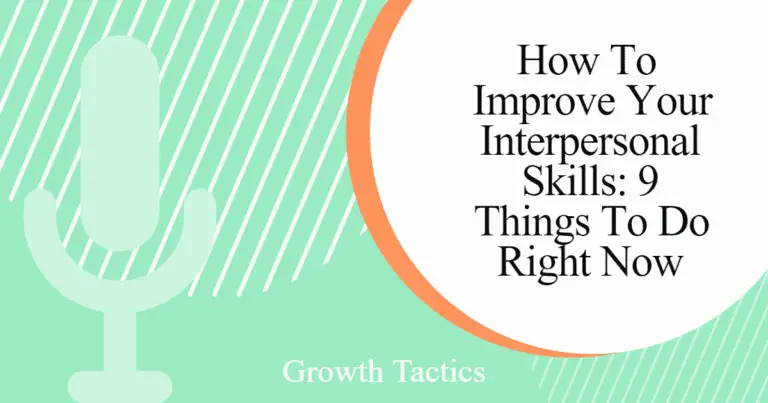Interpersonal skills are essential in life, from the workplace to our personal relationships. The ability to effectively communicate, interact, and work with other individuals and groups is invaluable.
But how do we improve our interpersonal skills?
What are the best practices for improving them?
Jump To Section
What Are Interpersonal Skills?
At its core, interpersonal skills are the skills used to effectively communicate, interact, and work with individuals and groups. This includes things like:
- working creatively with others
- communicating clearly
- collaborating
- adapting to change
- flexibility
- interacting effectively with diverse teams
- guiding and leading others
- teamwork
- being responsible
- active listening
- organization
- time management
- delegation
- motivation
- problem-solving
- conflict resolution
- patience
- positivity
Why Are Good Interpersonal Skills Important in the Workplace?

Interpersonal skills are important in the workplace because they help foster and maintain personal relationships, build trust and confidence, allow for better communication, and help employees see from a bigger lens.
People with strong interpersonal skills tend to build good relationships and can work well with others. They understand family, friends, coworkers, and clients well, making it easier to inspire confidence and trust.
Why Are Strong Interpersonal Skills Important in Our Personal Lives?
Interpersonal skills are important in our personal lives because they allow us to build healthy and harmonious relationships with others. They help us to prevent feelings of loneliness and depression, while also increasing our ability to connect with others who want to connect back.
Furthermore, people with good interpersonal skills are more confident in social situations, which can help us to build better relationships with family, friends, and colleagues. Additionally, having strong interpersonal skills can help us to better understand and communicate with others, which can lead to more successful relationships and better collaboration.
Identify Areas for Development
Identifying areas for developing interpersonal skills can be done in a few different ways. One way is to assess your current skill set. Think about your recent interactions with colleagues, bosses, friends, family, partners, and even strangers, and identify your strengths and weaknesses. This can help you pinpoint areas for improvement.
Another way to identify areas for developing interpersonal skills is to ask for feedback from people who work with you daily. This can provide insight into areas that they think could use improvement.
If you work in customer-facing roles, you can also monitor your NPS scores or customer feedback surveys to get a sense of where they feel you fall short.
Finally, you can also look at examples of interpersonal skills, such as the list we discussed earlier. This can help you gain a better understanding of the skills you need to develop.
How to Improve Interpersonal Skills

1. Improve Your Listening Skills
Listening is a critical skill that can help you build and maintain relationships, understand others, and make smart decisions. Here are some tips to help become a better listener:
Acknowledge the Speaker
When someone is speaking, make sure to actively show that you are interested in what they’re saying. Make eye contact and avoid distractions.
Listen Actively
Be open to what the speaker is saying instead of tuning out or forming a rebuttal. By listening actively, you’ll be able to better understand the speaker’s point of view.
Don’t Interrupt
Let the speaker finish their thought before responding. Interrupting can be seen as disrespectful and may make the speaker less likely to open up.
Ask Questions
Asking questions shows that you’re engaged in the conversation and encourages the speaker to continue. This will help you gain more information, and it’ll make the speaker feel more comfortable.
Paraphrase
If you’re having trouble understanding what the speaker is saying, paraphrase back what they said in your own words. This will help ensure that you have a good understanding of what was said.
Remain Nonjudgmental
Avoid making judgments or assumptions about what the speaker is saying. This will make it easier for the speaker to be honest and open with you.
Practice
The best way to become a better listener is to practice. Listen actively in everyday conversations and use the tips above to improve your listening skills.
2. Understand Body Language
Body language is a form of nonverbal communication that involves the use of physical behavior, expressions, and mannerisms to convey messages and emotions. It is an important part of communication, as it can provide insight into how someone is feeling or thinking. Understanding body language can help us better understand others and ourselves, as well as express emotions or intentions.
There are a few key elements to understanding body language. First, it is important to pay attention to context, as this can provide clues to the meaning behind body language.
Additionally, it is important to be aware of the different types of body language, such as facial expressions, gestures, and stances. Finally, it is important to be aware of the different rules of body language, such as how to interpret certain gestures or expressions.
By understanding body language, we can gain a better understanding of how people may be feeling in a given situation. This can help us to better communicate with others, as well as better interpret the messages they are trying to convey.
3. Learn to Handle Conflict Better
Conflict is an inevitable part of life, but it doesn’t have to be unmanageable. With the right strategies and techniques, you can learn to handle conflicts more effectively and productively.
One of the most important things to remember when dealing with conflict is to remain calm. Taking a few moments to collect your thoughts and take a few deep breaths can help you to stay focused and better handle the situation.
It’s also important to listen carefully to the other person and try to understand their perspective. Oftentimes, understanding the other person’s point of can help to move towards a resolution.
When responding to the other person, it’s important to remain respectful and avoid becoming defensive. Respectful communication can help to de-escalate tensions and create an environment for productive negotiation.
Finally, it’s important to recognize when it’s time to move on. If the conflict becomes too heated, it may be best to take a break and come back to the conversation later when emotions have cooled.
4. Work on Your Leadership Skills
Building leadership skills requires dedication and practice. There are a few steps you can take to start developing your leadership skills.
Determine your leadership style. Understanding your leadership style is the first step in developing managerial skills that are in line with your true nature. Is your leadership approach democratic, visionary, coaching, affiliative, pacesetting, or commanding?
Read books and join training programs. Reading books and joining training programs can help you gain a better understanding of leadership and how to develop your skills.
Work on your soft skills. Soft skills are important for effective leadership. These include communication, problem-solving, and decision-making skills.
Set goals and track progress. Setting goals and tracking your progress can help you stay on track and measure your progress.
Ask for more responsibilities. Taking on more responsibility can help you gain experience and develop your leadership skills.
Find volunteer opportunities. Volunteering can you gain experience and build your leadership skills.
Network with leaders. Networking with other leaders can help you learn from their experiences and gain insight into leadership.
Partner with a mentor. Having a mentor can help you gain insight into leadership and develop your skills.
5. Be More Empathetic
Being more empathetic is a skill that can be developed with practice. Empathy allows us to understand our friends and colleagues on a deeper level and helps foster better relationships.
To enhance your empathy, start by reflecting on your own emotions and experiences. Think about how you have felt in different situations and try to relate to others’ feelings.
Additionally, try to put yourself in the other person’s shoes and view the situation from their perspective. With practice, you can learn to be more empathetic and foster stronger relationships with your team.
6. Get More Comfortable Working With Others
Getting more comfortable with working with others requires practice and patience. Here are a few steps you can take to start feeling more comfortable in collaborative settings:
- Talk with people outside of your comfort zone. Try to engage in conversations with people of different backgrounds and experiences.
- Ask questions. Ask questions to get to know your colleagues better and gain a better understanding of the team.
- Practice active listening. Listen carefully to your colleagues and try to make an effort to understand their perspectives.
- Participate in group activities. Get involved in group activities, such as team building exercises, to become more familiar with the group.
- Offer help. Offer to help your colleagues when needed to show them you are invested in their success.
- Share your experiences. Don’t be afraid to share your experiences and knowledge with the group.
- Celebrate successes. Celebrate successes with your team to foster a positive working atmosphere.
- Cultivate relationships. Take the time to develop relationships with your team and get to know them better.
By following these steps, you can become more comfortable working with others and create a stronger and more productive team.
7. Practice Stress Management
Stress management is a skill that can be developed with practice. To manage stress, start by recognizing and assessing your stress triggers.
Identify the source of your stress and look for ways to reduce or eliminate it. Make sure to set realistic expectations and break down tasks into more manageable chunks.
Additionally, practice mindfulness and relaxation techniques, such as deep breathing and meditation, to help you stay calm and focused. Engage in physical activity to release stress hormones and improve your mood. Finally, take time for yourself and prioritize your self-care. With practice and dedication, you can learn to manage your stress and live a healthier and more balanced life.
8. Maintain a Positive Attitude
Maintaining a positive attitude can be an immense challenge, especially in times of difficulty. However, with the right tools, you can learn how to stay positive and cultivate a more positive outlook on life.
Start by identifying your triggers for negative thoughts. Find ways to reframe them or take a break from the influences that feed into them. Make sure to practice gratitude and actively focus on the positive aspects of life.
Surround yourself with positive people and be kind to yourself. Set realistic goals and expectations, and don’t be too hard on yourself if you don’t reach them. Take time to prioritize your self-care, and don’t forget to celebrate successes along the way.
With dedication and practice, you can learn to maintain a positive attitude and lead a healthier and more balanced life.
9. Pursue Continuous Improvement
Pursuing continuous improvement is an important part of any successful endeavor. To do so, start by setting measurable goals. Make sure these goals are SMART (Specific, Measurable, Attainable, Relevant, and Time-bound). Once you have clear goals, break them down into achievable tasks and develop a plan for how to achieve them.
Additionally, actively reflect on your progress and look for areas that need more attention or improvement. Don’t forget to celebrate successes along the way. Identify resources and mentors that can provide guidance and support. Finally, be flexible and don’t be afraid to make changes if necessary.
Did you enjoy this article on how to improve interpersonal skills? Please share and subscribe below.


